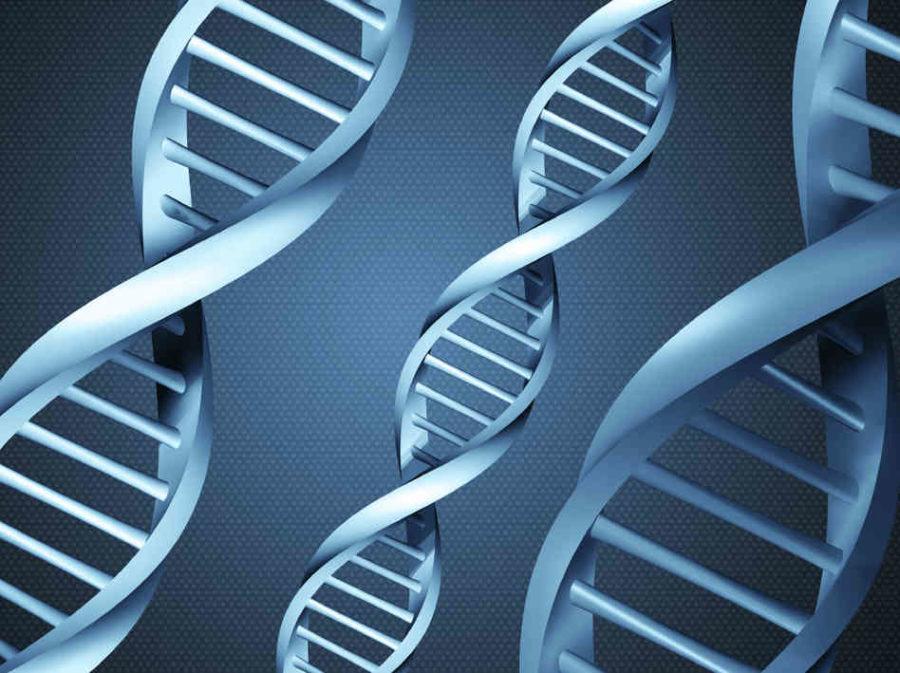[aesop_image img=”https://hilite.org/core/wp-content/uploads/2014/04/DNA.jpg” caption=”NPR.ORG / SOURCE” align=”left” captionposition=”left” lightbox=”off”]Recently, scientists revealed a major breakthrough in the field of synthetic biology – a functional, fully-synthesized chromosome.
The chromosome used for synthesis was one of yeast’s chromosomes, and yeast organisms with the new chromosome are known as the SynIII yeast strain. Scientists were able to get rid of long series of base pairs that didn’t code for anything, and add certain base pairs for desirable traits. What’s more, the yeast was observed to still reproduce.
Yeast strains with partially synthetic genetic material are already being employed in the production of ingredients for anti-malarial drugs, which makes this new discovery very promising for various industries. On a note that may strike closer to home, the fact that yeast is eukaryotic (has membrane-bound structures) means it is far more similar to us than, say, bacteria.
This is interesting because in the past, we’ve only been able to code for simpler organisms (the first prokaryotic genome was synthesized in 2010). This means we’re closer to the point of synthetic genomes for plants and animals – namely, humans.
Now here’s where things venture into the twilight zone a bit. There’s a lot of debate as to where synthesizing genes should stop. Do we use it in humans? If we did, we’d possibly be able to cure various psychiatric disorders, but many people find the prospect of changing the fabric of our beings highly unsettling.
My personal opinion is that we should not try to balance ourselves or slow the progress of research, because I can say assuredly that the scientific community would use this to do good things in the world. I have no fear of a Huxley-esque future because I simply don’t think people would allow it to become a reality. But of course someone with my empirical worldview has a very high threshold for how much experimentation and research is too much.
So, once more, that’s all for now. Further posts are to be expected after break. For science!




























![Keep the New Gloves: Fighter Safety Is Non-Negotiable [opinion]](https://hilite.org/wp-content/uploads/2024/12/ufcglovescolumncover-1200x471.png)
















































![Review: “We Live in Time” leaves you wanting more [MUSE]](https://hilite.org/wp-content/uploads/2024/12/IMG_6358.jpg)
![Review: The premise of "Culinary Class Wars" is refreshingly unique and deserving of more attention [MUSE]](https://hilite.org/wp-content/uploads/2024/12/MUSE-class-wars-cover-2.png)
![Introducing: "The Muses Who Stole Christmas," a collection of reviews for you to follow through winter [MUSE]](https://hilite.org/wp-content/uploads/2024/12/winter-muse-4.gif)
![Review: "Meet Me Next Christmas" is a cheesy and predictable watch, but it was worth every minute [MUSE]](https://hilite.org/wp-content/uploads/2024/11/AAAAQVfRG2gwEuLhXTGm3856HuX2MTNs31Ok7fGgIVCoZbyeugVs1F4DZs-DgP0XadTDrnXHlbQo4DerjRXand9H1JKPM06cENmLl2RsINud2DMqIHzpXFS2n4zOkL3dr5m5i0nIVb3Cu3ataT_W2zGeDAJNd_E-1200x884.jpg)
![Review: "Gilmore Girls", the perfect fall show [MUSE]](https://hilite.org/wp-content/uploads/2024/11/gilmore-girls.png)
![Review in Print: Maripaz Villar brings a delightfully unique style to the world of WEBTOON [MUSE]](https://hilite.org/wp-content/uploads/2023/12/maripazcover-1200x960.jpg)
![Review: “The Sword of Kaigen” is a masterpiece [MUSE]](https://hilite.org/wp-content/uploads/2023/11/Screenshot-2023-11-26-201051.png)
![Review: Gateron Oil Kings, great linear switches, okay price [MUSE]](https://hilite.org/wp-content/uploads/2023/11/Screenshot-2023-11-26-200553.png)
![Review: “A Haunting in Venice” is a significant improvement from other Agatha Christie adaptations [MUSE]](https://hilite.org/wp-content/uploads/2023/11/e7ee2938a6d422669771bce6d8088521.jpg)
![Review: A Thanksgiving story from elementary school, still just as interesting [MUSE]](https://hilite.org/wp-content/uploads/2023/11/Screenshot-2023-11-26-195514-987x1200.png)
![Review: "When I Fly Towards You", cute, uplifting youth drama [MUSE]](https://hilite.org/wp-content/uploads/2023/09/When-I-Fly-Towards-You-Chinese-drama.png)
![Postcards from Muse: Hawaii Travel Diary [MUSE]](https://hilite.org/wp-content/uploads/2023/09/My-project-1-1200x1200.jpg)
![Review: "Ladybug & Cat Noir: The Movie," departure from original show [MUSE]](https://hilite.org/wp-content/uploads/2023/09/Ladybug__Cat_Noir_-_The_Movie_poster.jpg)
![Review in Print: "Hidden Love" is the cute, uplifting drama everyone needs [MUSE]](https://hilite.org/wp-content/uploads/2023/09/hiddenlovecover-e1693597208225-1030x1200.png)
![Review in Print: "Heartstopper" is the heartwarming queer romance we all need [MUSE]](https://hilite.org/wp-content/uploads/2023/08/museheartstoppercover-1200x654.png)




